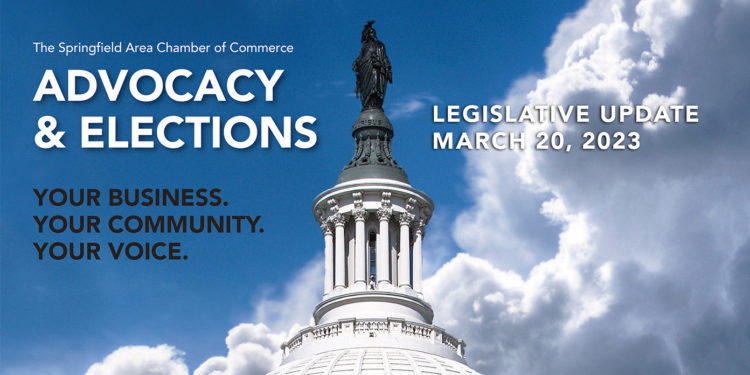Legislative Update: March 20, 2023

We’re monitoring Oregon’s 2023 legislative session for issues of impact and interest to our members. Here’s the latest update from our legislative counsel at the Oregon State Chamber of Commerce (OSCC).
The first major scheduling deadline of the 2023 session has been reached. March 17th saw about 1,200 bills die out of the 2,900 that have been introduced to date.
Almost none of the controversial bills with significant business impacts died, however. Nearly all of these bills have been kept alive for potential consideration between now and April 4th.
The next major deadline will be Tuesday, April 4th. Any bill not voted out of a policy committee by April 4th will die. We would expect another few hundred bills to die at this time, including many more of the bills that OSCC is concerned about.
The few bills that died include:
HB 2396 – a job-killing bill that would authorize DEQ to create an “indirect source” review program that would regulate projects that promote vehicle traffic or require off-road engines – and HB 3158, which would create a slew of new taxes and fees to fund an incentive program for non-road diesel vehicles. Among other things, the bill puts a new tax on tires and on the purchase and rental of diesel equipment. OSCC opposed HB 2396 and also opposed HB 3158. Both died on Friday.
SB 754 – which OSCC supported – would have made liability waivers enforceable in Oregon. This bill was a major initiative of the outdoor recreational sector as well as gyms and other fitness and recreational industries. Oregon is the only Western state with an inability to have enforceable liability waivers for customers who engage in fitness and recreational activities that may carry some inherent risk.
The vast majority of concerning bills are still alive, including:
Employer Liability for Workplace Bullying (SB 851): If SB 851 were to pass, Oregon would be the first state to impart liability on employers in such a significant way, including a private right of action against an employer when an employee feels slighted or when they may disagree with a disciplinary decision that was made.
Expanded Right to Refuse Dangerous Work (SB 907): SB 907 includes an expanded right to refuse work for reasons including heat, cold, equipment, chemicals, animals, etc. SB 907 also allows employees who refuse work to take paid sick time to compensate for those hours.
Mandatory Pay Disclosures for Job Postings (SB 925): SB 925 would require employers to disclose pay range and employment benefits within a job posting or for a promotion. Failure to do so would subject an employer to a lawsuit or employment claim. OSCC has serious concerns about the new liabilities.
Expanded age discrimination liabilities (HB 2800): HB 2800 introduces complexity and confusion into Oregon’s existing age discrimination laws by compromising employers’ ability to consider experience and by requiring employers to prove that age discrimination did not take place when an adverse employment decision is made.
Elimination of Natural Gas in Residential Housing (HB 3152): This bill phases out the use of natural gas in the residential housing sector. It prevents line extension allowances for new gas line extensions that support the use of gas in residential buildings.
It also establishes that the policy of Oregon is to protect residential utility customers from risks of stranded fossil fuel assets and potential increases in energy burden while achieving state’s GHG emissions reduction goals. Such a requirement would shift costs to commercial customers.
First party lawsuits on insurance claims (HB 3242 and HB 3243): Allows policy holders to sue their insurance companies for bad faith. These bills have been tried in other states and have benefitted few but resulted in significant premium spikes in commercial policies for all.
DEQ Title V permit fees (HB 3229): This bill is a massive 80% increase in Title V air emissions fees implemented by DEQ. Will hurt local manufacturers as permit costs are increased to save DEQ regulator positions. The bill also allows DEQ to raise additional fees without legislative approval.
Other bills still alive the OSCC supports include:
Increased estate tax exemption (HB 2426): Legislators are starting to express concern that Oregon’s estate tax is being levied on middle income Oregonians due to high real estate values.
Increased CAT Tax exemption (HB 2433 / SB 127): OSCC continues to be optimistic that a solution can be found that would increase the CAT tax threshold to as high as $5 million from the current level of $1 million.
Hiring and Retention bonuses (HB 3205): This bill would allow employers to begin to offer hiring and retention bonuses again as current state pay equity laws have made these bonuses legally tenuous.
Testimony will be accepted until 3pm on Wednesday!
The Springfield Chamber of Commerce will be publishing the OSCC’s legislative updates weekly, or as received. Any opinions expressed or implied are those of OSCC and do not necessarily reflect those of the Springfield Chamber or its representatives. If you’d like more information, please visit our Advocacy & Elections Page.
Discover more from Springfield Bottom Line
Subscribe to get the latest posts sent to your email.





